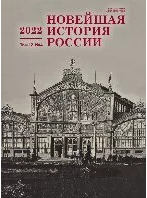Советская ментальность: маркеры социально исторической идентичности
Soviet Mentality: Markers of Socio-Historical Identity
Author(s): V. A. Somov, Elena S. VolkovaSubject(s): Cultural history, Diplomatic history, Economic history, Ethnohistory, Social history, Behaviorism, Evaluation research, Interwar Period (1920 - 1939), WW II and following years (1940 - 1949), Post-War period (1950 - 1989), Identity of Collectives
Published by: Издательство Исторического факультета СПбГУ
Keywords: Soviet mentality; USSR; revolution; atheism; Great Patriotic War; doublethink; anti-Sovietism;
Summary/Abstract: Modern historiography of Soviet society is at the stage of forming an impartial assessment of its place in the history of Russian civilization. The most famous articles on the history of the USSR are often a documented expression of the author’s research position, which does not always strive for impartiality. Such studies evoke the feeling of an ongoing “civil war” — now on the “fronts” of science and journalism. Moreover, a number of authors concentrate on studying, mainly, the negative features of the “Soviet project”, transferring these characteristics to the entire Soviet society. Following in line with the noumenal approach to the study of Soviet society, the authors call on the scientific community to move from a detailed factual description of the Soviet era to identifying its basic characteristics, while abandoning politicized assessments. The purpose of the study is to determine the main components of the Soviet mentality based on an analysis of its key manifestations in different periods of the history of the Soviet state. To achieve this goal, markers of the socio-historical identity of the Soviet person are introduced, such as “revolution”, “idea”, “atheism”, “war”, “doublethink”, etc. It was established that the set of mental characteristics was not constant, they were updated in depending on the specific historical situation. The noumenal characteristics of a Soviet person were historically formed as a result of the dialectical interaction of the ideal type of a “non-party Bolshevik” — a socially oriented collectivist with a heightened sense of duty and his antipode — the notorious “Sovok” — an irresponsible careerist and social opportunist. In conclusion, it is noted, that the Soviet mentality can be defined more as a vector of promising targeted development than as a stable socio-psychological type.
Journal: Новейшая история России
- Issue Year: 12/2022
- Issue No: 4
- Page Range: 1035-1048
- Page Count: 14
- Language: Russian

